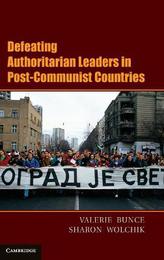
|
Defeating Authoritarian Leaders in Postcommunist Countries
Hardback
Main Details
| Title |
Defeating Authoritarian Leaders in Postcommunist Countries
|
| Authors and Contributors |
By (author) Valerie J. Bunce
|
|
By (author) Sharon L. Wolchik
|
| Series | Cambridge Studies in Contentious Politics |
|---|
| Physical Properties |
| Format:Hardback | | Pages:396 | | Dimensions(mm): Height 240,Width 160 |
|
| Category/Genre | Social and political philosophy |
|---|
| ISBN/Barcode |
9781107006850
|
| Classifications | Dewey:324.91717 |
|---|
| Audience | | Professional & Vocational | |
|---|
| Illustrations |
10 Tables, unspecified; 11 Line drawings, unspecified
|
|
Publishing Details |
| Publisher |
Cambridge University Press
|
| Imprint |
Cambridge University Press
|
| Publication Date |
30 June 2011 |
| Publication Country |
United Kingdom
|
Description
From 1998 to 2005, six elections took place in postcommunist Europe that had the surprising outcome of empowering the opposition and defeating authoritarian incumbents or their designated successors. Valerie J. Bunce and Sharon L. Wolchik compare these unexpected electoral breakthroughs. They draw three conclusions. First, the opposition was victorious because of the hard and creative work of a transnational network composed of local opposition and civil society groups, members of the international democracy assistance community and graduates of successful electoral challenges to authoritarian rule in other countries. Second, the remarkable run of these upset elections reflected the ability of this network to diffuse an ensemble of innovative electoral strategies across state boundaries. Finally, elections can serve as a powerful mechanism for democratic change. This is especially the case when civil society is strong, the transfer of political power is through constitutional means, and opposition leaders win with small mandates.
Author Biography
Valerie J. Bunce is Professor of Government and International Studies at Cornell University, where she served as chair of the Department of Government from 2001 to 2007. Since receiving her doctorate in political science at the University of Michigan in 1976, Bunce has taught, in addition to Cornell, at Lake Forest College, Northwestern University, the Central European University (Budapest) and the University of Zagreb. She recently served as the President of the American Association for the Advancement of Slavic Studies and Vice-President of the American Political Science Association and is a member of the American Academy of Arts and Sciences. A leading expert on Central and Eastern Europe and the former Soviet Union, Bunce has focused her research since the fall of communism on four issues, all involving comparisons among the postcommunist states of Europe and Eurasia. She is the author of articles that have appeared in the American Political Science Review, Comparative Political Studies, Comparative Politics, World Politics, International Organization, the American Journal of Political Science, the British Journal of Political Science, the Slavic Review, Communist and Postcommunist Studies and East European Politics and Societies. She has written two books: Do New Leaders Make a Difference? Executive Succession and Public Policy under Capitalism and Socialism and Subversive Institutions: The Design and the Destruction of Socialism and the State. She is also the co-editor of Democracy and Authoritarianism in the Postcommunist World. She has received grants from the Council for the International Exchange of Scholars, Smith Richardson Foundation, International Research and Exchange Board, the Russell Sage Foundation, the American Council of Learned Societies, the National Endowment for Democracy, the National Council for Eurasian and East European Research, the MacArthur Foundation, the Rockefeller Foundation (Resident Fellowship at Bellagio), the International Cen Sharon L. Wolchik is Professor of Political Science and International Affairs at George Washington University. She has served as Director of the Russian and East European Studies Program and the mid-career Masters in International Policy and Practice Program at the Elliott School of International Affairs and is a member of the Institute for European, Russian, and Eurasian Studies. She has served on the board of the American Association for Slavic Studies, the Advisory Committee of the Cold War International History Project of the Woodrow Wilson Center of the Smithsonian Institution, the Association of Women in Slavic Studies and Friends of Slovakia and as Chair of the Board of the National Council for Eurasian and East European Research. She is also Adjunct Chair of the Advanced Area Studies Seminar of the Foreign Service Institute of the US Department of State and a member of the Advisory Council of the Academic Academy of the Ministry of Foreign Affairs of the Czech Republic. She has done research on a variety of aspects of politics in communist and postcommunist Europe, including gender issues, ethnic relations, mass-elite relations, citizens' political values and attitudes, and transitions to democracy. She is the author of Czechoslovakia in Transition: Politics, Societies, and Economics and is the co-editor of Domestic and Foreign Policies in Eastern Europe in the 1980s; Women, State, and Party in Eastern Europe; Women and Democracy: Latin America and Central and Eastern Europe; Women in Power in Post-communist Parliaments; The Social Legacies of Communism and Central and East European Politics: From Communism to Democracy. She has also authored numerous articles in the Slavic Review, Comparative Political Studies, World Politics, Women and Politics, Current History, Problems of Post-Communism, Studies in Comparative Communism, the Journal of Communist and Post-Communist Studies, the Japanese Journal of Political Science, the Journal of Women's History and East
Reviews'This book is a valuable addition to the literature on post-communist democratisation.' Political Studies
|